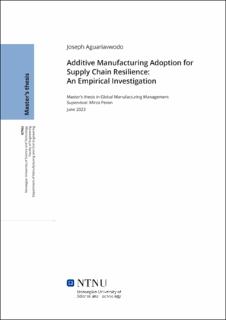| dc.description.abstract | Supply chain disruptions are a major concern for organizations, as they can lead to delays,
increased costs, and lost revenue. Additive manufacturing, also known as 3D printing, has
emerged as a promising technology for enhancing supply chain resilience by providing a more
flexible and adaptable manufacturing process. This technology can act as an important tool in
mitigating disruptions in the supply chain. However, the empirical evidence on the impact of
additive manufacturing on supply chain resilience is limited.
This thesis presents an empirical investigation of the use of additive manufacturing for supply
chain resilience. The study involved a Delphi study methodology, including a questionnaire sent
to a panel of experts in industry from organizations that have implemented additive
manufacturing in their supply chain. The study gathered expert opinion on the adoption of
additive manufacturing, the perceived benefits and challenges of additive manufacturing for
supply chain resilience, and the factors that influence the adoption of additive manufacturing.
The results provided insights into the current challenges and opportunities of adopting additive
manufacturing in supply chains, as well as possible countermeasures that could be exploited to
overcome the identified challenges. The findings of the study suggest that additive
manufacturing can enhance supply chain resilience by enabling faster time-to-market, reduced
lead times, improved customization, reduced waste, and increased supply chain flexibility.
However, the successful implementation of additive manufacturing in the supply chain requires
careful consideration of the challenges and opportunities presented by this technology, as well as
the development of a strategic approach that takes into account the unique characteristics of the
organization and its supply chain.
The study also identified several factors that influence the adoption of additive manufacturing,
including the availability of skilled personnel, the availability of materials, the suitability of
additive manufacturing for specific applications, and the level of collaboration and
communication among stakeholders in the supply chain. Overall, the findings of this study
provide important insights into the use of additive manufacturing for enhancing supply chain
resilience. The study contributes to the academic literature on additive manufacturing and supply
chain resilience and provides practical guidance for organizations that are considering the
adoption of additive manufacturing in their supply chain. | |
